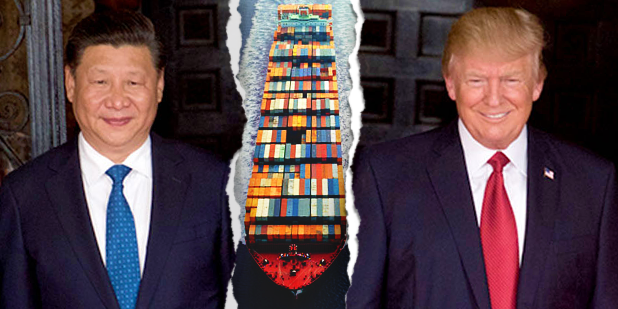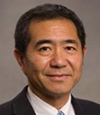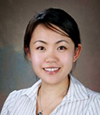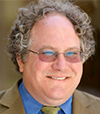Join us for a free one-day workshop for educators at the Japanese American National Museum, hosted by the USC U.S.-China Institute and the National Consortium for Teaching about Asia. This workshop will include a guided tour of the beloved exhibition Common Ground: The Heart of Community, slated to close permanently in January 2025. Following the tour, learn strategies for engaging students in the primary source artifacts, images, and documents found in JANM’s vast collection and discover classroom-ready resources to support teaching and learning about the Japanese American experience.
A Roundtable Discussion of the U.S.-China Trade War
The USC U.S.-China Institute presents a discussion on American and Chinese aims and tactics in the US-China trade war as well as its impact and potential costs.
Where

Watch videos of the discussion.
The first stirrings of the U.S.-China trade war came on the U.S. campaign trail in 2016, but threats became actions this spring. President Trump argues the war has been going on for years, but that the American side has never chosen to fight back. President Xi told Trump in 2017 that there were “a thousand reasons to make the China-US relationship a success and not a single reason to break it,” but his government and state media have more recently argued more forcefully that China will not yield to American “blackmail.”
At our roundtable, we will discuss American and Chinese aims and tactics, examine the impact of the conflict, outline potential costs if the trade war continues, and review possible routes to resolution. We’ll discuss both the macro perspective and how companies are coping with the uncertainty generated by the conflict.
Speakers
 Jonathan Aronson is Professor of Communication at the USC Annenberg School for Communication and Journalism as well as Professor of International Relations at USC. Professor Aronson writes on issues related to international communication policy, globalization and international trade and trade negotiations. He has also served as the director of USC’s School of International Relations and Executive Director of the Annenberg Center for Communication. He served as President of the Association of Professional School of International Affairs (APSIA), as a Council on Foreign Relations International Affairs fellow in the Office of the US Trade Representative, and is a member of the Council on Foreign Relations and the Los Angeles Institute of Humanities. Aronson graduated from Harvard University and received his PhD from Stanford University.
Jonathan Aronson is Professor of Communication at the USC Annenberg School for Communication and Journalism as well as Professor of International Relations at USC. Professor Aronson writes on issues related to international communication policy, globalization and international trade and trade negotiations. He has also served as the director of USC’s School of International Relations and Executive Director of the Annenberg Center for Communication. He served as President of the Association of Professional School of International Affairs (APSIA), as a Council on Foreign Relations International Affairs fellow in the Office of the US Trade Representative, and is a member of the Council on Foreign Relations and the Los Angeles Institute of Humanities. Aronson graduated from Harvard University and received his PhD from Stanford University.
 Baizhu Chen studies macroeconomics and international economics, with an emphasis on China. His work has been published in the Journal of Peace Research, European Journal of Political Economy, China Economic Review, Applied Financial Economics, Social Choice and Welfare, and Journal of Macroeconomics. He is Senior Researcher at the Institute of Finance and Banking at the Chinese Academy of Social Sciences, chief economist of Sino-Century Capital, a VC firm in Shanghai, and former president of the Chinese Economists Society. He is academic director for Marshall's GEMBA program, and a recipient of the Golden Apple Award.
Baizhu Chen studies macroeconomics and international economics, with an emphasis on China. His work has been published in the Journal of Peace Research, European Journal of Political Economy, China Economic Review, Applied Financial Economics, Social Choice and Welfare, and Journal of Macroeconomics. He is Senior Researcher at the Institute of Finance and Banking at the Chinese Academy of Social Sciences, chief economist of Sino-Century Capital, a VC firm in Shanghai, and former president of the Chinese Economists Society. He is academic director for Marshall's GEMBA program, and a recipient of the Golden Apple Award.
 Nan Jia is an associate professor at the USC Marshall School of Business. She holds a PhD in Strategic Management from the Rotman School of Management, University of Toronto (Canada). Her research interests include corporate political strategy, business-governance relationships, and corporate governance in international business. Her research has been published in the Management Science, Strategic Management Journal, Organizational Science, Administrative Science Quarterly, Academy of Management Journal, Academy of Management Review, and Journal of Politics. She serves on the editorial boards of the Strategic Management Journal, Academy of Management Review, and the Journal of International Business Studies.
Nan Jia is an associate professor at the USC Marshall School of Business. She holds a PhD in Strategic Management from the Rotman School of Management, University of Toronto (Canada). Her research interests include corporate political strategy, business-governance relationships, and corporate governance in international business. Her research has been published in the Management Science, Strategic Management Journal, Organizational Science, Administrative Science Quarterly, Academy of Management Journal, Academy of Management Review, and Journal of Politics. She serves on the editorial boards of the Strategic Management Journal, Academy of Management Review, and the Journal of International Business Studies.
 John Odell is Professor Emeritus of International Relations at the University of Southern California (USC). He is also Senior Fellow at the Centre for International Governance Innovation. He researches the governance of the world economy--why governments and international organizations do what they do in international economic relations, and how they could do better--and climate change. Former: Visiting Fellow, Office of the US Trade Representative, Peterson Institute in Washington, and Graduate Institute in Geneva; Editor, International Organization; Director, USC School of International Relations and its Center for international Studies; Faculty member, Harvard University. He has published extensively about negotiations among states on trade, exchange rates and debt, including in the WTO and the IMF. He received a PhD in Political Science and MA from the University of Wisconsin-Madison.
John Odell is Professor Emeritus of International Relations at the University of Southern California (USC). He is also Senior Fellow at the Centre for International Governance Innovation. He researches the governance of the world economy--why governments and international organizations do what they do in international economic relations, and how they could do better--and climate change. Former: Visiting Fellow, Office of the US Trade Representative, Peterson Institute in Washington, and Graduate Institute in Geneva; Editor, International Organization; Director, USC School of International Relations and its Center for international Studies; Faculty member, Harvard University. He has published extensively about negotiations among states on trade, exchange rates and debt, including in the WTO and the IMF. He received a PhD in Political Science and MA from the University of Wisconsin-Madison.
 Brian Peck joined USC Gould School of Law as director of the Center for Transnational Law and Business and adjunct assistant professor of law in the fall of 2016. Peck served as deputy director in charge of international affairs and business development for the Governor’s Office of Business and Economic Development (GO-Biz) from 2013 to 2016. Peck was senior director for Intellectual Property at the Office of the U.S. Trade Representative from 2003-2005, and director of Japanese Affairs at USTR from 2001-2003. Peck led an interagency team responsible for developing and implementing policies to strengthen the protection of intellectual property rights in Japan, Korea, Southeast Asia and Latin America; and was also responsible for overseeing U.S. trading partners’ compliance with bilateral and international obligations to protect and enforce IP rights. Peck graduated Order of the Coif and received his law degree, cum laude, from the University of San Diego School of Law. He received his BA from the UC Berkeley.
Brian Peck joined USC Gould School of Law as director of the Center for Transnational Law and Business and adjunct assistant professor of law in the fall of 2016. Peck served as deputy director in charge of international affairs and business development for the Governor’s Office of Business and Economic Development (GO-Biz) from 2013 to 2016. Peck was senior director for Intellectual Property at the Office of the U.S. Trade Representative from 2003-2005, and director of Japanese Affairs at USTR from 2001-2003. Peck led an interagency team responsible for developing and implementing policies to strengthen the protection of intellectual property rights in Japan, Korea, Southeast Asia and Latin America; and was also responsible for overseeing U.S. trading partners’ compliance with bilateral and international obligations to protect and enforce IP rights. Peck graduated Order of the Coif and received his law degree, cum laude, from the University of San Diego School of Law. He received his BA from the UC Berkeley. Clayton Dube heads the USC U.S.-China Institute which focuses on the multithreaded U.S.-China relationship. Dube teaches Chinese history and studies the role of the media in U.S.-China relations.
Clayton Dube heads the USC U.S.-China Institute which focuses on the multithreaded U.S.-China relationship. Dube teaches Chinese history and studies the role of the media in U.S.-China relations.

Get off at the Expo Park/USC stop for a short walk to campus. Click here for more information.
For maps and directions to campus, visit the University Park Campus Map & Driving Directions page.
McCarthy Way Parking Structure (Formerly Parking Structure X) - $12/day
Enter at the Figueroa Street Entrance at McCarthy Way (Formerly Entrance 3
Featured Articles
Please join us for the Grad Mixer! Hosted by USC Annenberg Office of International Affairs, Enjoy food, drink and conversation with fellow students across USC Annenberg. Graduate students from any field are welcome to join, so it is a great opportunity to meet fellow students with IR/foreign policy-related research topics and interests.
RSVP link: https://forms.gle/1zer188RE9dCS6Ho6
Events
Hosted by USC Annenberg Office of International Affairs, enjoy food, drink and conversation with fellow international students.
Join us for an in-person conversation on Thursday, November 7th at 4pm with author David M. Lampton as he discusses his new book, Living U.S.-China Relations: From Cold War to Cold War. The book examines the history of U.S.-China relations across eight U.S. presidential administrations.




